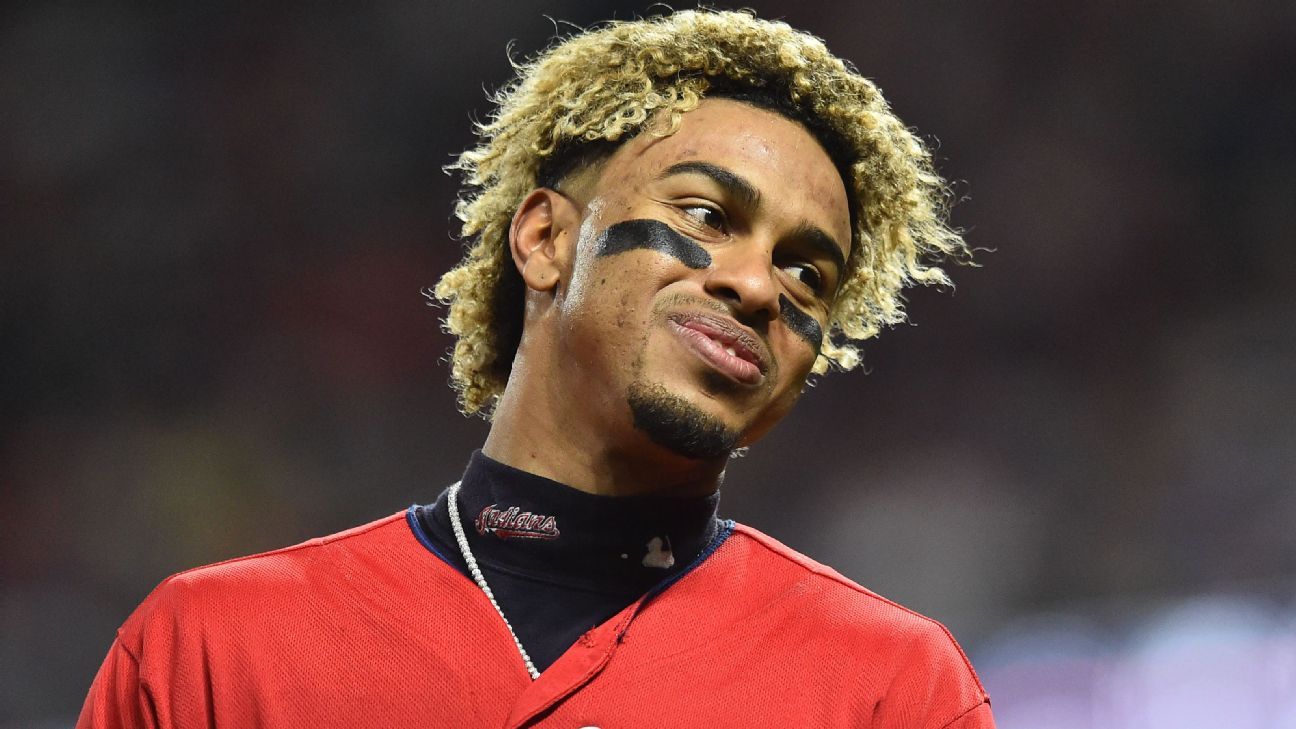GOODYEAR, Ariz. — Francisco Lindor didn’t sound like a man who had been shopped around all winter and was approaching the end of his time with the Cleveland Indians. He sounded genuinely upbeat about the potential of a franchise that has spent the past two offseasons reducing payroll. He sounded sincere when he addressed reporters after Monday’s workout and said, “I wanna win here. I wanna stay here.”
In the end, as is always the case, money will be the deciding factor. Twenty months from now, Lindor will become eligible for free agency and will command a contract that could exceed the eight-year, $260 million deal Nolan Arenado signed to stay with the Colorado Rockies. The Indians probably won’t go there. You could argue they can — that practically every billionaire owner has the financial resources for such a commitment — and Lindor would agree.
“The team is not broke, the league is not broke,” he said. “There’s money.”
But the reality is Lindor’s free-agent years could ultimately absorb about a quarter of the Indians’ budget, and that ratio doesn’t necessarily yield sustainable success in the sport. Indians president Chris Antonetti was adamant about his desire to keep Lindor when he spoke at the start of camp, but he also acknowledged the inherent difficulties.
“When you look at the economics of baseball, and the realities of building championship teams in a small market, it gets really tough,” Antonetti said. “The interest is there, the desire is there, on both sides, to try to get something done. And whether or not that’s possible, we just don’t know.”
Consider this a plea to play it out, regardless of where that leads. If the Mookie Betts trade taught us anything, it’s that attaining equal value for generational talents is unrealistic — especially if they’re nearing free agency, even more so in a time when front offices are so protective of their prospects.
Rival evaluators believe the Boston Red Sox did well in their trade with the Los Angeles Dodgers, considering Betts is only a season away from free agency and that they also wanted to offload David Price‘s contract. But it might not have been worth all the blowback. It might not have been enough to justify all those days — 81 of them, at least — when fans will sit in the stands at Fenway Park and not see Mookie Betts play.
Few executives were surprised Lindor wasn’t traded this offseason. Many believed the Indians were mainly trying to get a sense for his market value, open to being blown away by an offer but mostly gathering intel for a potential trade in July. Given the urgency of teams vying for a spot in the postseason, the return might be better then than it would have been this past offseason. But if the Indians wait until the 2020-21 offseason, when only a year would separate Lindor from free agency, trading a franchise pillar might no longer be worth it.
In short, the Indians may reach that proverbial fork in the road in about five months.
“Our first priority would be if we could find a way to extend Francisco’s term here,” Antonetti said. “If that’s not possible, then we have to look at alternate paths. And one of those paths is Francisco staying here till the end of his contract or term with us and leaving as a free agent. That could happen. That’s happened with players here in the past. And there have been other situations in which we’ve traded them. It’s really dependent upon a lot of factors that would play into those decisions. But our clear preference would be for him to be here beyond 2021.”
Lindor, who won’t turn 27 until November, accumulated 23.2 FanGraphs wins above replacement from 2016 to 2019, sixth highest in the sport. During that time, he batted .284/.346/.495, hit 118 home runs, stole 81 bases, played in four All-Star Games, won two Silver Sluggers and took home a couple of Gold Gloves at shortstop. The Indians are 72 years removed from their last World Series championship. They may never employ someone as good, as magnetic or as exciting as Lindor — and they’re still in a position to win with him.
The Minnesota Twins look like legitimate contenders and the Chicago White Sox suddenly loom as threats, but the Indians have the pitching depth to sustain the loss of Corey Kluber and still possess the talent to recapture the American League Central. The window is still open, even if only slightly, and who knows when it might be again? The Indians can hold on to Lindor for these remaining two years, give it their best shot, then live with the results of it. His talent justifies impracticality.
“I’m not sure we’re gonna win 105 games or 100 games, but we’re gonna compete, and it’s gonna be a fun year,” Lindor said. “We’ll surprise a lot of people. A lot of people are not counting on us. I am.”
Publicly, at least, Lindor and Antonetti continue to hold out hope for an extension.
The question is whether the Indians can consistently field a winning team with Lindor on their payroll.
“That’s the biggest challenge,” Antonetti acknowledged. “It’s not the desire.”
Antonetti said both sides have made “meaningful efforts” in their pursuit of an extension. Lindor understands his value and understands the business components that make trading him a possibility. The Dodgers, New York Mets, San Diego Padres and Cincinnati Reds were all linked to him over the winter, but Lindor said he “didn’t really pay much attention” to the rumors.
“Single, no kids, two dogs,” he noted. “I can just pack up and go.”
Perhaps he should just, you know, stay.
